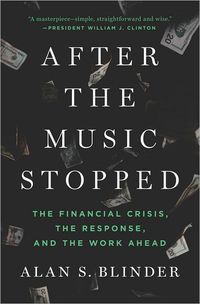

Purchase
The Financial Crisis, the Response, and the Work Ahead
Penguin Press
February 2013
On Sale: January 24, 2013
476 pages
ISBN: 1594205302
EAN: 9781594205309
Kindle: B008EKORIY
Hardcover / e-Book
Add to Wish List
Non-Fiction
One of our wisest and most clear-eyed economic thinkers
offers a masterful narrative of the crisis and its lessons Many fine books on the financial crisis were first drafts of
history—books written to fill the need for immediate
understanding. Alan S. Blinder, esteemed Princeton
professor, Wall Street Journal columnist, and former vice
chairman of the Federal Reserve Board, held off, taking the
time to understand the crisis and to think his way through
to a truly comprehensive and coherent narrative of how the
worst economic crisis in postwar American history happened,
what the government did to fight it, and what we can do from
here—mired as we still are in its wreckage. With bracing clarity, Blinder shows us how the U.S.
financial system, which had grown far too complex for its
own good—and too unregulated for the public good—experienced
a perfect storm beginning in 2007. Things started unraveling
when the much-chronicled housing bubble burst, but the
ensuing implosion of what Blinder calls the “bond bubble”
was larger and more devastating. Some people think of the
financial industry as a sideshow with little relevance to
the real economy—where the jobs, factories, and shops are.
But finance is more like the circulatory system of the
economic body: if the blood stops flowing, the body goes
into cardiac arrest. When America’s financial structure
crumbled, the damage proved to be not only deep, but wide.
It took the crisis for the world to discover, to its horror,
just how truly interconnected—and fragile—the global
financial system is. Some observers argue that large global
forces were the major culprits of the crisis. Blinder
disagrees, arguing that the problem started in the U.S. and
was pushed abroad, as complex, opaque, and overrated
investment products were exported to a hungry world, which
was nearly poisoned by them. The second part of the story explains how American and
international government intervention kept us from a total
meltdown. Many of the U.S. government’s actions,
particularly the Fed’s, were previously unimaginable. And to
an amazing—and certainly misunderstood—extent, they worked.
The worst did not happen. Blinder offers clear-eyed answers
to the questions still before us, even if some of the
choices ahead are as divisive as they are unavoidable. After
the Music Stopped is an essential history that we cannot
afford to forget, because one thing history teaches is that
it will happen again.
Comments
No comments posted.
Registered users may leave comments.
Log in or register now!
| 


 © 2003-2024 off-the-edge.net
all rights reserved Privacy Policy
© 2003-2024 off-the-edge.net
all rights reserved Privacy Policy